西方文明史 (2)
西方文明史

意大利文艺复兴摘要:文艺复兴的意义不仅仅在于它取得的巨大的文学艺术科学成就,更为重要的一面在于它促使欧洲人从以神为中心过渡到以人为中心,在于整个西方的觉醒,在于人们把重点从来世转移到现世。
它唤醒了人们积极进取的精神、创造精神以及科学实验的精神,从而在精神方面为资本主义制度的胜利和确立开辟了道路。
文艺复兴无疑是欧洲爆发的前夜,也是人类前进中的壮歌。
关键词:文艺复兴意大利背景古典文化人性美术14至16世纪中叶的文艺复兴时期,是欧洲由封建社会向资本主义社会过渡的时期。
随着封建制的不断衰落,资本主义萌芽的不断发展,此时的欧洲出现了一个轰轰烈烈的文化革命运动。
文艺复兴是欧洲历史中一次重大的新文化运动。
恩格斯给予它很高的评价,认为“这是一次人类从来没有经历过的最伟大的、进步的变革。
”①(一)文艺复兴的背景在十四、十五世纪时,当西欧西班牙、法国、英国正走上统一的道路时,意大利由于教皇和霍亨斯陶棻家族争夺对意大利统治权的结果,仍然处在四分五裂的局面。
这时意大利已经完全摆脱了神圣罗马帝国的控制,而教皇的势力既不足以统一全国,但又拥有足以阻挠意大利统一的力量。
这是意大利仍处于分崩离析状态的根本原因。
因为国内和国外的斗争剧烈,各国的统治者们必须对政治工作深思熟虑,老谋深算,才能保住自己的地位。
于是一个新的历史事实出现了,即政治工作成为一种艺术。
这个新的政治精神表现在各个方面,决定各国的内部宪法和对外政策。
正是在这个新式的政治生命的基础之上,出现了一种新的文化——即文艺复兴文化。
欧洲文艺复兴发生在十四——十六世纪,这并不是偶然的。
恩格斯指出:“欧洲式文艺复兴的时代是以封建制度普遍解体和城市兴起为基础的。
”②而欧洲文艺复兴运动最先从意大利开始,也是有它的经济制度和阶级斗争方面的根源的。
马克思指出,“在十四和十五世纪,在地中海沿岸的某些城市已经稀疏地出现了资本主义生产的最初萌芽。
”③这是指意大利的许多城市小国而言的,在那里已经出现了工场手工业、早期的资本家。
西方文明史

西方哲学史上,柏拉图最早建构了二元论哲学体系。
理念论:把世界分为两个。
现实的世界是个别的、不可靠的世界,是短暂的、变动的、不纯粹的、混杂的、不完满的,因此是不真实的;“理念”的世界是永恒的世界,是静止的、纯粹的、完满的,因此真实的,具有一般性。
由此延伸出一般与个别、共相与殊相、本质与现象、概念与具体等相关问题,成为几千年西方哲学讨论的一个中心。
所以尼采认为:整个几千年的西方哲学,实质上就是柏拉图的思维方式,即一种二元对立的思维方式的伸展。
哲学史家梯利认为:“柏拉图是一个诗人和神秘主义者,也是哲学家和论辩学家。
他以罕见的程度把逻辑分析和抽象思维的巨大力量,同令人惊奇的诗意的想象和深邃的神秘感情结合起来。
”柏拉图的美学是他哲学思想不可分割的一部分。
“美和艺术的概念第一次被纳入一个伟大的哲学体系。
”柏拉图的美学思想与他的哲学中神秘的和诗意的东西,并不是一回事。
其美学思想主要体现在以下几个方面:一、美的本体论——“理念”(Idea)的理论柏拉图赞同苏格拉底的观念,坚信理性能够获得真知,把追求“真”、“善”、“美”当作是哲学探索的目的。
真知:必须是关于真实的、永恒存在的事物的知识,而非关于流动的、变化的、朝生暮死的事物的知识。
像物理学这样的学问所研讨的就是现实世界的知识,因此它不能把握永恒的、不变的事物和存在。
真知是关于“理念”的知识。
永恒的是“理念”的世界,现实世界是对“理念”的世界的模仿或“分有”。
柏拉图认为,存在的事物分为四个层次:最高级的是“理念”的世界,拥有绝对的静止性、纯粹性、永恒性,最真实;其次是数学对象,即数字和几何图形等;再次是个体事物,即个体的“活物”,也就是自然中不断流变的动物、植物、人工制品等;最次的是肖像,“指的首先是影子,其次是水面和光滑体表面上的映像,以及其他类似的东西。
”它们之间的关系是:“理念”是一切事物的蓝本。
个体事物是同名的“理念”的摹本或影子。
肖像又是个体事物的摹本或影子。
《西方文明史》课程教学大纲
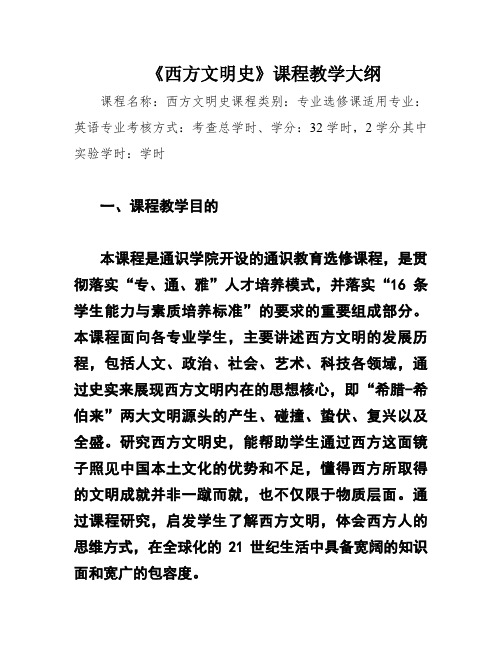
《西方文明史》课程教学大纲课程名称:西方文明史课程类别:专业选修课适用专业:英语专业考核方式:考查总学时、学分:32学时,2学分其中实验学时:学时一、课程教学目的本课程是通识学院开设的通识教育选修课程,是贯彻落实“专、通、雅”人才培养模式,并落实“16条学生能力与素质培养标准”的要求的重要组成部分。
本课程面向各专业学生,主要讲述西方文明的发展历程,包括人文、政治、社会、艺术、科技各领域,通过史实来展现西方文明内在的思想核心,即“希腊-希伯来”两大文明源头的产生、碰撞、蛰伏、复兴以及全盛。
研究西方文明史,能帮助学生通过西方这面镜子照见中国本土文化的优势和不足,懂得西方所取得的文明成就并非一蹴而就,也不仅限于物质层面。
通过课程研究,启发学生了解西方文明,体会西方人的思维方式,在全球化的21世纪生活中具备宽阔的知识面和宽广的包容度。
通过研究本课程,学生应达到以下目标:1.了解西方文明史的演变脉络(知识层面)。
2.了解西方文明史上各阶段的主要文明成就及历代思想家的重要观点(知识层面)。
3.了解不同时期西方思想与中国本土思想的交流与碰撞(知识层面)。
4.能对西方文化和学术传统有一个较客观的代价判别(能力层面)。
5.了解查找课程相干资料的路子和方法(能力层面)。
6.能将西方文化中的有益思想运用到一样平常研究生活中(能力和素养层面)。
二、课程教学要求理解“西方”概念的形成及历史演变;理解“文明”之概念,比较城市文明与农耕文明的差异(教学重点);了解西方文明史的研究对象和研究领域(教学重点)。
三、先修课程综合英语四、课程教学重、难点理解“西方”概念的形成及历史演变;理解“文明”之概念,比较城市文明与农耕文明的差异(教学重点);了解西方文明史的研究对象和研究领域(教学重点)。
五、课程教学方法与教学手段采用讲授法、课堂讨论、及研究性研究等方法,经由进程多媒体,观看“MOOC中国”等开放平台上的《人类简史》课程,以进行知识扩充及巩固进步。
西方文化史 (2)
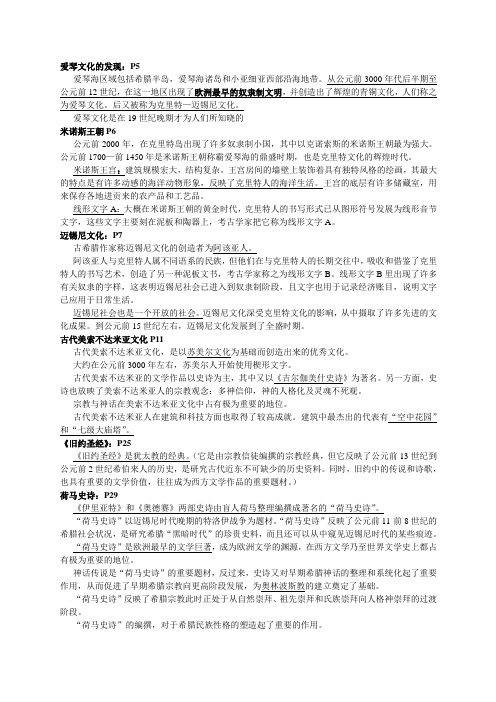
爱琴文化的发现:P5爱琴海区域包括希腊半岛,爱琴海诸岛和小亚细亚西部沿海地带。
从公元前3000年代后半期至公元前12世纪,在这一地区出现了欧洲最早的奴隶制文明,并创造出了辉煌的青铜文化,人们称之为爱琴文化。
后又被称为克里特—迈锡尼文化。
爱琴文化是在19世纪晚期才为人们所知晓的米诺斯王朝P6公元前2000年,在克里特岛出现了许多奴隶制小国,其中以克诺索斯的米诺斯王朝最为强大。
公元前1700—前1450年是米诺斯王朝称霸爱琴海的鼎盛时期,也是克里特文化的辉煌时代。
米诺斯王宫:建筑规模宏大,结构复杂。
王宫房间的墙壁上装饰着具有独特风格的绘画,其最大的特点是有许多动感的海洋动物形象,反映了克里特人的海洋生活。
王宫的底层有许多储藏室,用来保存各地进贡来的农产品和工艺品。
线形文字A:大概在米诺斯王朝的黄金时代,克里特人的书写形式已从图形符号发展为线形音节文字,这些文字主要刻在泥板和陶器上,考古学家把它称为线形文字A。
迈锡尼文化:P7古希腊作家称迈锡尼文化的创造者为阿该亚人。
阿该亚人与克里特人属不同语系的民族,但他们在与克里特人的长期交往中,吸收和借鉴了克里特人的书写艺术,创造了另一种泥板文书,考古学家称之为线形文字B。
线形文字B里出现了许多有关奴隶的字样,这表明迈锡尼社会已进入到奴隶制阶段,且文字也用于记录经济账目,说明文字已应用于日常生活。
迈锡尼社会也是一个开放的社会。
迈锡尼文化深受克里特文化的影响,从中摄取了许多先进的文化成果。
到公元前15世纪左右,迈锡尼文化发展到了全盛时期。
古代美索不达米亚文化P11古代美索不达米亚文化,是以苏美尔文化为基础而创造出来的优秀文化。
大约在公元前3000年左右,苏美尔人开始使用楔形文字。
古代美索不达米亚的文学作品以史诗为主,其中又以《吉尔伽美什史诗》为著名。
另一方面,史诗也放映了美索不达米亚人的宗教观念:多神信仰,神的人格化及灵魂不死观。
宗教与神话在美索不达米亚文化中占有极为重要的地位。
西方文明史2_597401790

Xerxes (519-465 BC)
• the sort of overweening man who closed his eyes to human boundaries and whom the gods delighted in cutting down
• 所有的傲慢收获的将是 泪水。 泪水。 • 神明最终将和人们清算 • 他们的傲慢欠下的账。 他们的傲慢欠下的账。 ——埃斯库罗斯 埃斯库罗斯
• A group of men at the great Olympic Games, competing in athletics or in horseracing, drama, music, or poetry; or it could be the audience at a production of an Aeschylean tragedy at the City Dionysia in the theatre of Dionysus in Athens. For to the Greeks there were no sharp divisions between the intellectual, physical, and spiritual sides of human nature.
• The Greek found the main significance of life not in the relation of man with God, but in man’s relations with himself and with his fellows.
Meaning of life
The Greek gods
• The Greek gods were superior to men, in power, beauty, and immortality, but they were not ethically superior, and, unlike Yahveh, they did not demand that men follow an exacting code of morality. The Greeks looked not to their gods for an ethical code, but to their own reason and innate sense of the good. The result was a culture that seems remarkably serene and guilt-free.
西方文明史reaction paper之Plato2
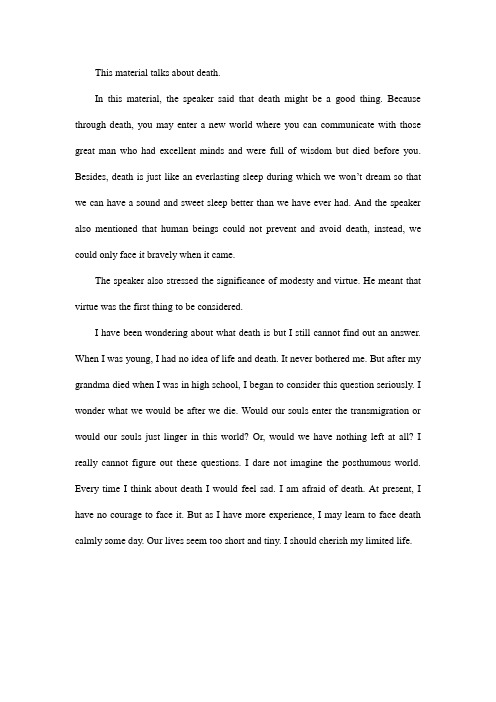
This material talks about death.In this material, the speaker said that death might be a good thing. Because through death, you may enter a new world where you can communicate with those great man who had excellent minds and were full of wisdom but died before you. Besides, death is just like an everlasting sleep during which we won’t dream so that we can have a sound and sweet sleep better than we have ever had. And the speaker also mentioned that human beings could not prevent and avoid death, instead, we could only face it bravely when it came.The speaker also stressed the significance of modesty and virtue. He meant that virtue was the first thing to be considered.I have been wondering about what death is but I still cannot find out an answer. When I was young, I had no idea of life and death. It never bothered me. But after my grandma died when I was in high school, I began to consider this question seriously. I wonder what we would be after we die. Would our souls enter the transmigration or would our souls just linger in this world? Or, would we have nothing left at all? I really cannot figure out these questions. I dare not imagine the posthumous world. Every time I think about death I would feel sad. I am afraid of death. At present, I have no courage to face it. But as I have more experience, I may learn to face death calmly some day. Our lives seem too short and tiny. I should cherish my limited life.。
最新版西方文明史精品课件Chapter 2 The Roman Republic (1)

Symbols of Royalty
ivory chair purple robes fasces 束棒
fasces
法国大革命时期国徽
the US House of Representatives
Roman Republican Government
II. The Senate - about 300 members of noble or patrician class. A. Senators appointed for life, must have held elected office before. B. Appointed commanders, assigned funds, but could not pass laws. C. Originally “elected” kings, had a conservative effect on Roman culture and politics.
Rmbly - Included all adult male citizens Assembly of the Centuries
A. made up of the entire army B. Wealthier citizens voted first and influenced results C. elected the consuls and several other magistrates D. voted on bills the Senate put before it
fought over Sicilian city Second Punic War - (219-202 BCE) Hannibal of Carthage led army across Alps into Italy. Third Punic War - (149-146 BCE) North Africa becomes Roman province.
西方文化史 第二章汇总
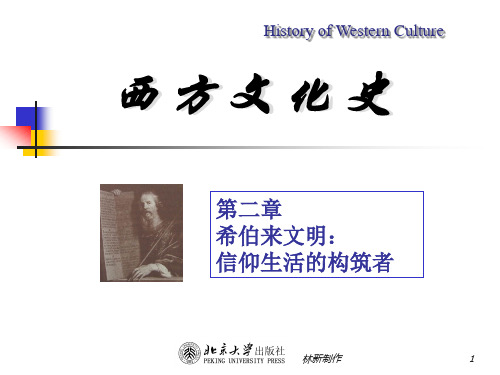
林新制作
11
大卫王开创了希伯来 历史最辉煌的篇章。 耶路撒冷从此成为希 伯来人心中永恒的都 城。大卫王亦被视为 希伯来历史上最伟大 的君主。
历史
大卫与歌利亚
林新制作
12
历史
大卫王死后,其子所罗门王(Solomon ,在位时间约公元前968年—公元前928年)继 位。他于公元前956年前后在耶路撒冷兴建了 犹太教的圣殿。圣殿在耶路撒冷的建造和启用 是希伯来民族历史上的一个极其重要的事件。
林新制作
历史
18
历史
•到了公元前333年前 后,马其顿王亚力山 大大帝的东征打破了 那里的平静,犹太人 生活的家园和近东其 他地区一道旋即成为 希腊帝国的一部分。
林新制作
19
历史
•希腊式生活方式导致了 对犹太人的传统生活方 式的冲击和宗教信仰的 迫害,犹太民族在忍无 可忍的情况下,于公元 前165年举行了史称的 “玛喀比起义”,正是 这一胜利使得犹太人开 创的一神信仰得以留存。
林新制作
20
历史
当罗马帝国取代希腊成为世界霸主后, 犹太人开始生活在罗马人的统治下,公 元70年,犹太人当时的政治中心耶路撒 冷终于被罗马军队攻破,战死者数以万 计。破城的罗马人放火焚毁了犹太人的 第二圣殿。第二圣殿时期到此结束。
林新制作
21
•罗马统治者为了防止 犹太人再进行反抗, 宣布禁止犹太人在圣 地圣城居住。至此, 犹太人完全失去了在 自己家园生活的权利, 向外流散过程加剧。 犹太民族的历史进入 了长达1800年的“大 流散时期”。
林新制作
25
宗教
希伯来文明的核心是被称 为“犹太教”的部分,犹 太教还是一个有着基本信 仰,明确教义,拥有宗教 典籍和有组织形态的宗教。 其基本思想主要包括一神 论、契约观、末世论等。
辽宁大学《西方文明史》2022-2023第二学期期末试卷

2022~2023学年度第二学期《西方文明史》期末试卷课程代码:试卷编号:考试日期:年月日答题时限:120分钟考试形式:闭卷笔试得分统计表:题号得分一二三四五一、单项选择题(每题2分,共20分)得分1、下列哪位人物是古希腊神话中的英雄之一?()A.亚历山大大帝B.赫拉克勒斯C.凯撒大帝D.古斯塔夫·瓦萨2、以下哪位文艺复兴时期的艺术家创作了壁画《最后的晚餐》?()A.米开朗基罗B.达芬奇C.拉斐尔D.布鲁内莱斯基3、罗马帝国的最长统治者是谁?()A.哈德良B.卡卡尼乌斯C.尤利安努斯D.塞普蒂米乌斯·塞维鲁斯4、哪个事件标志着法国大革命的开始?()A.法兰西第一帝国的建立B.急进派在国民公会的胜利C.巴士底狱的被攻占D.波旁王朝的崩溃5、第一次世界大战的爆发时间是?()A.1912年B.1915年C.1918年D.1914年6、下面哪个事件是古希腊战争的一部分?()A.特洛伊战争B.伊拉克战争C.七年战争D.韩战7、文艺复兴的核心地区是?()A.法国B.德国C.希腊D.意大利8、哪一位不属于法国第五共和国的总统?()A.弗朗索瓦·密特朗B.弗朗索瓦·奥朗德C.尼古拉·萨尔科齐D.弗朗西斯·露克布什9、哪一位著名哲学家提出了“存在即合理”?()A.笛卡尔B.康德C.赫尔德林D.黑格尔10、巴黎公社是哪一年发生的事件?()A.1870年B.1871年C.1848年D.1789年二、填空题(每题2分,共20分)得分1、___________是被认为是首次使用火药武器的历史时期。
2、“文艺复兴”的意思是___________,代表了从14世纪到17世纪欧洲文化和艺术的一次重生。
3、据信,印刷术是在15世纪由____________发明的,极大地促进了文艺复兴的传播。
4、《乌托邦》是由_________编写,他通过这部作品批评了当时的社会现实和不平等。
西方文明史讲义
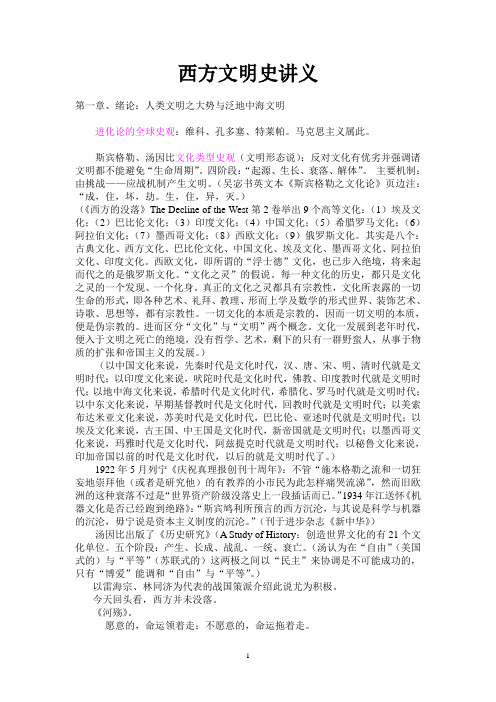
西方文明史讲义第一章、绪论:人类文明之大势与泛地中海文明进化论的全球史观:维科、孔多塞、特莱帕。
马克思主义属此。
斯宾格勒、汤因比文化类型史观(文明形态说):反对文化有优劣并强调诸文明都不能避免“生命周期”。
四阶段:“起源、生长、衰落、解体”。
主要机制:由挑战——应战机制产生文明。
(吴宓书英文本《斯宾格勒之文化论》页边注:“成,住,坏,劫。
生,住,异,灭。
)(《西方的没落》The Decline of the West第2卷举出9个高等文化:(1)埃及文化;(2)巴比伦文化;(3)印度文化;(4)中国文化;(5)希腊罗马文化;(6)阿拉伯文化;(7)墨西哥文化;(8)西欧文化;(9)俄罗斯文化。
其实是八个:古典文化、西方文化、巴比伦文化、中国文化、埃及文化、墨西哥文化、阿拉伯文化、印度文化。
西欧文化,即所谓的“浮士德”文化,也已步入绝境,将来起而代之的是俄罗斯文化。
“文化之灵”的假说。
每一种文化的历史,都只是文化之灵的一个发现、一个化身。
真正的文化之灵都具有宗教性,文化所表露的一切生命的形式,即各种艺术、礼拜、教理、形而上学及数学的形式世界、装饰艺术、诗歌、思想等,都有宗教性。
一切文化的本质是宗教的,因而一切文明的本质,便是伪宗教的。
进而区分“文化”与“文明”两个概念。
文化一发展到老年时代,便入于文明之死亡的绝境,没有哲学、艺术,剩下的只有一群野蛮人,从事于物质的扩张和帝国主义的发展。
)(以中国文化来说,先秦时代是文化时代,汉、唐、宋、明、清时代就是文明时代;以印度文化来说,吠陀时代是文化时代,佛教、印度教时代就是文明时代;以地中海文化来说,希腊时代是文化时代,希腊化、罗马时代就是文明时代;以中东文化来说,早期基督教时代是文化时代,回教时代就是文明时代;以美索布达米亚文化来说,苏美时代是文化时代,巴比伦、亚述时代就是文明时代;以埃及文化来说,古王国、中王国是文化时代,新帝国就是文明时代;以墨西哥文化来说,玛雅时代是文化时代,阿兹提克时代就是文明时代;以秘鲁文化来说,印加帝国以前的时代是文化时代,以后的就是文明时代了。
西方文化史
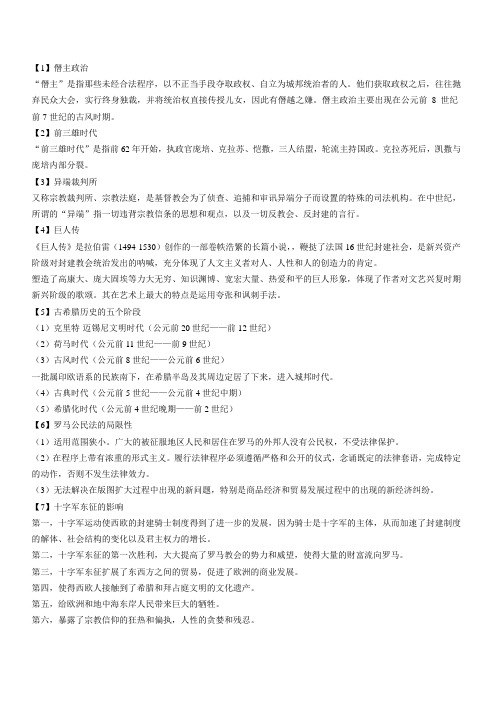
【1】僭主政治“僭主”是指那些未经合法程序,以不正当手段夺取政权、自立为城邦统治者的人。
他们获取政权之后,往往抛弃民众大会,实行终身独裁,并将统治权直接传授儿女,因此有僭越之嫌。
僭主政治主要出现在公元前8世纪-前7世纪的古风时期。
【2】前三雄时代“前三雄时代”是指前62年开始,执政官庞培、克拉苏、恺撒,三人结盟,轮流主持国政。
克拉苏死后,凯撒与庞培内部分裂。
【3】异端裁判所又称宗教裁判所、宗教法庭,是基督教会为了侦查、追捕和审讯异端分子而设置的特殊的司法机构。
在中世纪,所谓的“异端”指一切违背宗教信条的思想和观点,以及一切反教会、反封建的言行。
【4】巨人传《巨人传》是拉伯雷(1494-1530)创作的一部卷帙浩繁的长篇小说,,鞭挞了法国16世纪封建社会,是新兴资产阶级对封建教会统治发出的呐喊,充分体现了人文主义者对人、人性和人的创造力的肯定。
塑造了高康大、庞大固埃等力大无穷、知识渊博、宽宏大量、热爱和平的巨人形象,体现了作者对文艺兴复时期新兴阶级的歌颂。
其在艺术上最大的特点是运用夸张和讽刺手法。
【5】古希腊历史的五个阶段(1)克里特-迈锡尼文明时代(公元前20世纪——前12世纪)(2)荷马时代(公元前11世纪——前9世纪)(3)古风时代(公元前8世纪——公元前6世纪)一批属印欧语系的民族南下,在希腊半岛及其周边定居了下来,进入城邦时代。
(4)古典时代(公元前5世纪——公元前4世纪中期)(5)希腊化时代(公元前4世纪晚期——前2世纪)【6】罗马公民法的局限性(1)适用范围狭小。
广大的被征服地区人民和居住在罗马的外邦人没有公民权,不受法律保护。
(2)在程序上带有浓重的形式主义。
履行法律程序必须遵循严格和公开的仪式,念诵既定的法律套语,完成特定的动作,否则不发生法律效力。
(3)无法解决在版图扩大过程中出现的新问题,特别是商品经济和贸易发展过程中的出现的新经济纠纷。
【7】十字军东征的影响第一,十字军运动使西欧的封建骑士制度得到了进一步的发展,因为骑士是十字军的主体,从而加速了封建制度的解体、社会结构的变化以及君主权力的增长。
西方文明2
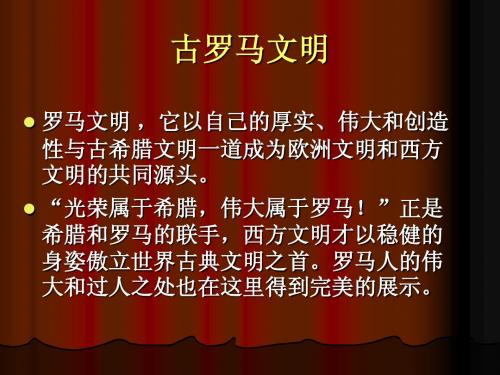
鼓吹自然法的执政官、 查士丁尼与随从 法学家 西塞罗
5、万民法体系: 公元7世纪的查士丁尼皇帝设立专门委员会 编纂罗马法,形成了包括《查士丁尼法 典 》、《法学总论》(《法学阶梯》)、 《学说汇编》、《查士丁尼新律》 (《新 敕令》)四种法律文献在内的法律汇编, 统称为《查士丁尼民法大全》,这是罗马 法体系最终完成的标志。
万神殿(Pantheon )是至今完整保存的唯一一座罗马帝国 时期建筑:又称潘提翁神庙。公元前27年兴建、公元120 年重建,万神殿意指必须供奉罗马全部的神。
希腊帕特浓神庙
3.娱乐型建筑
安曼剧场(公元151年)
大斗兽场
它是迄今遗存的古罗马建筑工程中最卓越的代表,也是古 罗马帝国国威的象征。
4.广场:圣彼得广场一角
(三)罗马法的作用与影响:
第一、罗马帝国制定和实施罗马法的目的是为了 维系和稳定庞大帝国的统治。 第二、罗马法巨大的历史影响。 德国著名法学家耶林在其著作《罗马法精神》一 书中说:“罗马帝国曾三次征服世界,第一次以 武力,第二次以宗教(基督教),第三次以法律。 武力因罗马帝国的灭亡而消失,宗教随着人民思 想觉悟的提高、科学的发展而缩小了影响,唯有 法律征服世界是最为持久的征服。”
泰伦斯(普布留斯· 伦提乌斯· 菲尔,前 泰 阿 190?-159)流传下来6部喜剧。这些喜剧比较 严肃,不如普劳图斯的生动活泼,但结构严谨, 语言优雅,因此在文艺复兴之后被看成喜剧的 典范。
其代表作是《婆母》(公元前160)。
(二)、古罗马建筑特征
1、 结构特征:雄伟、实用,注重内部空 间。
(1).古罗马大角斗场:公元72年,由维斯巴西 安皇帝开始修建,公元80年由其子蒂托斯皇帝隆 重揭幕。 占地20000平方米,围墙周长527米,长轴188米, 短轴156米,墙高57米,相当于一座19层的现代 楼房的高度。场内可容5万观众。围墙分四层砌成, 一、二、三层均为半露圆柱装饰。每两根半露圆 柱之间是一座长方形拱门,一、二、三层合计有 拱门80座
初中历史 西方文明之源2 人教版精品课件
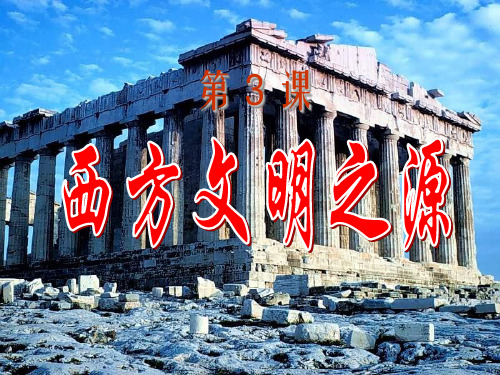
2.扩张: 布匿战争: 罗马——迦太基 公元前3—2世纪 取得地中海霸权
3.动荡:斯巴达克起义
古罗马奴隶处境十分悲惨,他们除了要从 事繁重的劳动外,奴隶主还专门挑选身强力 壮的奴隶送上角斗场,让他们自相残杀或同 野兽博斗,用鲜血和生命来供奴隶主消遣。 这种惨无人道的行经, 激化奴隶与奴隶主的 矛盾,终于导致了公 元前73年斯巴达克起 义。
古代罗马
1.建立: 公元前8世纪: 罗马城建立
三、共古和国代最罗高权马力:为两名执政官,都由贵族担任,两
人权力相等,任期一年,一切政令必须两人一致同意才
能中1一实.建人行独。立裁当:,国拥家公有遇元至到前高紧无急8世尚情的况纪权,:力经。元罗由老马于院城执提政名建官,立任执期政短官, 两元老人院又是互古相罗牵马制公兼,元有所前立以法真50和正9管掌年理握:权国罗的家国大马家权建机的立关是元,共老制和院订国丁。
小心翼翼珍藏着,和母亲在一起的美好时光。母亲身体一直不好,最后的几年光景几乎是在医院渡过,然而和母亲在一起的毎一刻都是温暖美好的。四年前,母亲还是离开了这个世界,离开了我。生命就是如此脆弱,逝去和別离,陈旧的情绪某年某月的那一刻如水泻闸。水在流,云在走,聚散终有时,不贪恋一生,有你的这一程就是幸运。那是地久天长的在我的血液中渗透,永远在我的心中,在我的生命里。 时光就是这么不经用,很快自己做了母亲,我才深深的知道,这样的爱,不带任何附加条件,不因万物毁灭而更改。只想守护血浓于水的旧时光,即便峥嵘岁月将容颜划伤,相信一切都是最好的安排。那时的时光无限温柔,当清水载着陈旧的往事,站在时光这头,看时光那头,一切变得分明。执笔书写,旧时光的春去秋来,欢喜也好,忧伤也好,时间窖藏,流光曼卷里所有的宠爱,疼惜,活色生香的脑海存在。
第3课
西方文明史重点
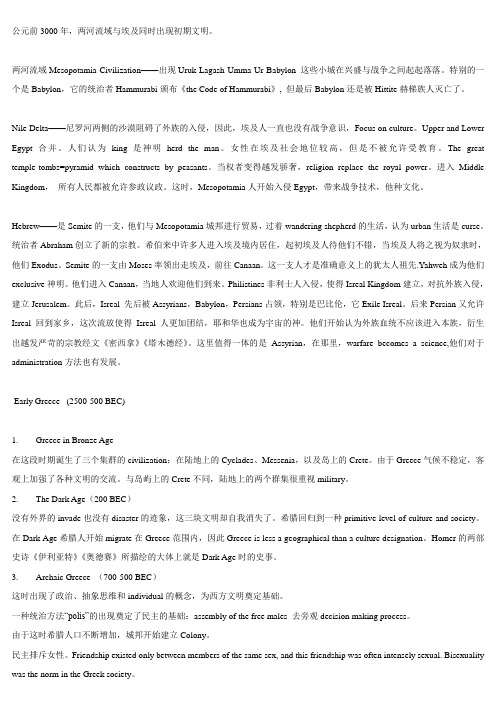
公元前3000年,两河流域与埃及同时出现初期文明。
两河流域Mesopotamia Civilization——出现Uruk Lagash Umma Ur Babylon 这些小城在兴盛与战争之间起起落落。
特别的一个是Babylon,它的统治者Hammurabi颁布《the Code of Hammurabi》, 但最后Babylon还是被Hittite赫梯族人灭亡了。
Nile Delta——尼罗河两侧的沙漠阻碍了外族的入侵,因此,埃及人一直也没有战争意识,Focus on culture。
Upper and Lower Egypt合并。
人们认为king是神明herd the man。
女性在埃及社会地位较高,但是不被允许受教育。
The great temple-tombs=pyramid which constructs by peasants。
当权者变得越发骄奢,religion replace the royal power。
进入Middle Kingdom,所有人民都被允许参政议政。
这时,Mesopotamia人开始入侵Egypt,带来战争技术,他种文化。
Hebrew——是Semite的一支,他们与Mesopotamia城邦进行贸易,过着wandering shepherd的生活,认为urban生活是curse。
统治者Abraham创立了新的宗教。
希伯来中许多人进入埃及境内居住,起初埃及人待他们不错,当埃及人将之视为奴隶时,他们Exodus。
Semite的一支由Moses率领出走埃及,前往Canaan。
这一支人才是准确意义上的犹太人祖先.Yahweh成为他们exclusive神明。
他们进入Canaan,当地人欢迎他们到来。
Philistines非利士人入侵,使得Isreal Kingdom建立,对抗外族入侵,建立Jerusalem。
此后,Isreal 先后被Assyrians,Babylon,Persians占领,特别是巴比伦,它Exile Isreal。
- 1、下载文档前请自行甄别文档内容的完整性,平台不提供额外的编辑、内容补充、找答案等附加服务。
- 2、"仅部分预览"的文档,不可在线预览部分如存在完整性等问题,可反馈申请退款(可完整预览的文档不适用该条件!)。
- 3、如文档侵犯您的权益,请联系客服反馈,我们会尽快为您处理(人工客服工作时间:9:00-18:30)。
英文学院研究生学期课程论文课程名称西方文明史任课教师王晓红论文标题The Fall and Decline of Roman Empire姓名郝旭姣班级英语语言文学2班学号2010493日期2011.3.28INTRODUCTIONThe Roman Empire was one of the most powerful empires in the history of mankind. In fact, it may even be considered the most powerful empire to have ever existed. However, the mighty empire of Rome has fallen. The Roman Empire emerged from the Roman Republic when Julius Caesar and Augustus Caesar transformed it from a republic into a monarchy. Rome reached its zenith in the 2nd century, and then fortunes slowly declined with many revivals and restorations along the way. This was a period in which the state structure, undermined by the barbarian invasions which provoked famine and destruction, was in deep economic and political crisis, and the population in Rome and in the countryside lived in precarious conditions.The decline of the Roman Empire is one of the events traditionally marking the end of Classical Antiquity and the beginning of the European Middle Ages. Throughout the 5th century, the Empire‟s territories in Western Europe and northwestern Africa, including Italy, fell to various invading or indigenous peoples in what is sometimes called the Migration period. Although the eastern half still survived with borders essentially intact for several centuries until the Arab expansion, the Empire as a whole had initiated major cultural and political transformations since the Crisis of the Third Century, with the shift towards a more openly autocratic and ritualized form of government, the adoption of Christianity as the state religion, and a general rejection of the traditions and values of Classical Antiquity. “The decline of the Roman Empire was not a single event but a gradual process that lasted several centuries.”(奥托.基弗,174) This process was characterized by increasing economic inequality, incompetent political and military leadership, foreign invasions and political instability resulting in repeated usurpations and all-out civil war. On the other hand, under some strong emperors, the Empire enjoyed stretches of respite from its woes.There are many elements that lead to the final blow.For years, the well-disciplined Roman army held the barbarians of Germany back. Then in the third century A. D. the Roman soldiers were pulled back from the Rhine-Danube frontier to fight civil war in Italy. This left the Roman border open to attack. Gradually Germanic hunters and herders from the north began to overtake Roman lands in Greece and Gaul. Then in 476 A. D. the Germanic general Odacer or Odovacar overthrew the last of the Roman Emperors, Augustulus Romulus. From then on the western part of the Empire was ruled by Germanic chieftain. Roads and bridges were left in disrepair and fields left untilled. Pirates and bandits made travel unsafe. Cities could not be maintained without goods from the farms, trade and business began to disappear. The Roman Empire had become too big to control easily. Soldiers or families in distant parts of the Empire adopted local customs and the Empire was made up not only of natives from the Italian peninsula, but barbarians from the conquered lands. Corruption became rampant. Slavery and a large discontented mass of people appeared. The reasons for the decline of the Empire are still debated today and likely multiple. Above there are generally three causes for the fall and decline of Roman Empire: social causes, economical causes, and political causes.PART ONESOCIAL CAUSESThe social cause is manifested in many aspects. Slavery and a large discontented mass of people; a decline in the traditional Roman citizenry; moral decay; patriotism declined as people lost their allegiance to the state; Christianity challenged the traditional Roman character traits. These are all the elements that lead to the collapse of the Roman Empire, and the following are some important aspects which have a close relationship with the decline.1.1Decline in morals and valuesEven during PaxRomana --A long period from Augstus to Marcus Aurelius when the Roman Empire was stable and relatively peaceful there were 32,000 prostitutes in Rome. “Emperors like Caligula and Nero became infamous for wasting money on lavish parties where guests drank and ate until they became sick.”(Ru, 72) The most popular amusement was watching the gladiatorial combats in the Colosseum. Emperors like Nero and Caligula became infamous for wasting money on lavish parties where guests ate and drank until they became ill. These were attended by the poor, the rich, and frequently the emperor himself. As gladiators fought, vicious cries and curses were heard from the audience. One contest after another was staged in the course of a single day. “Should the ground become too soaked with blood, it was covered over with a fresh layer of sand and the performance went on.” (Cavafy and J. M. Coetzee, 123)There are a large distance between the rich and the poor. Wealthy Romans lived in a domus, or house, with marble walls, floors with intricate colored tiles, and windows made of small panes of glass. Most Romans, however, were not rich, they lived in small smelly rooms in apartment houses with six or more stories called islands. Each island covered an entire block. At one time there were 44,000 apartment houses within the city walls of Rome. The more shaky wooden stairs a family had to climb, the cheaper the rent became. The upper apartments that the poor rented for $40 a year were hot, dirty, crowed, and dangerous. Anyone who could not pay the rent was forced to move out and live on the crime-infested streets. Because of this cities began to decay. This phenomenon caused a lot of people became discontented with the government.1.2 ChristianityT here were several reasons for the fall of the Roman Empire. Each one interweaved with the other. Many even blame the initiation of Christianity for the decline. Christianity made many Roman citizens into pacifists, making it more difficult to defend against the barbarian attackers. Also money used to build churches could have been used to maintain the Roman Empire.When Constantine establishedreligious toleration in the Roman Empire, he took upon himself the title of Pontiff. Although he was not necessarily a Christian himself (he wasn‟t baptized until he was on his deathbed), he gave Christians privileges and oversaw major Christian religious disputes. He may not have understood how the pagan cults, including those of the emperors, were at odds with the new monotheistic religion, but they were, and in time the old Roman religions lost out. Although the path from pagan to Christian Rome had a few more hurdles, it was from the time of Constantine that Roman Christianity is dated. At this early point, however, the emperors of Rome controlled the religion since emperors held the power to appoint bishops. Over time, Church leaders became influential and took away power from the emperor. Christian beliefs conflicted with the working of empire.PART TWOECONOMICAL CAUSESHistorian Michael Rostovtzeff and economist Ludwig von Mises both argued that unsound economic policies played a key role in the impoverishment and decay of the Roman Empire. There are many causes economical causes, for example, productivity declined, too much dependence on foreign products, the high cost of government military and welfare, and parts of the empire were not taxed while other were overtaxed and so on.2.1 InflationMany historians argue that the rapid growth of the empire over a relatively short time and the economic inflation that followed contributed substantially to the empire‟s decay. Due to the vast size of the empire, it required an enormous budget to maintain the infrastructure necessary for its survival, including roads (essential for communication, transportation, and the moving of armies) and aqueducts (many cities relied on the water thus provided). Moreover, the empire faced enemies on all sides due to its expansion into their territories, and huge sums of silver and gold wererequired to keep up its armies. To cope with both problems, the empire was forced to raise taxes frequently, and also to adulterate its coins, causing inflation to skyrocket into hyperinflation. The roman economy suffered from inflation (an increase in prices) beginning after the reign of Marcus Aurelius. Once the Romans stopped conquering new lands, the flow of gold into the Roman economy decreased. Yet much gold was being spent by the Romans to pay for luxury items. This meant that there was less gold to use in coins. As the amount of gold used in coins decreased, the coins became less valuable. To make up for this loss in value, merchants raised the prices on the goods they sold. Many people stopped using coins and began to barter to get what they needed. Eventually, salaries had to be paid in food and clothing, and taxes were collected in fruits and vegetables. This in turn caused major economic stresses that some historians regard as central in Rome‟s decline. According to Historian Michael Rostovtzeff and economist Ludwig von Mises , by the 2nd century AD, the Roman Empire had developed a complex market economy in which trade was relatively free. Tariffs were low and laws controlling the prices of foodstuffs and other commodities had little impact because they did not fix the prices significantly below their market levels. After the 3rd century, however, debasement of the currency led to inflation. The price control laws then resulted in prices that were significantly below their free-market equilibrium levels.2.2 Low tradesThe Roman Empire produced few exportable goods. Material innovation, whether through entrepreneurialism or technological advancement, all but ended long before the final dissolution of the Empire. By the 3rd century the monetary economy had collapsed. Monetary taxation was replaced with direct requisitioning, for example taking food and cattle from farmers. Individuals were forced to work at their given place of employment and remain in the same occupation. Farmers became tied to the land, as were their children, and similar demands were made on all other workers, producers, and artisans as well. Workers were organized into guilds and businessesinto corporations called collegian. Both became de facto organs of the state, controlling and directing their members to work and produce for the state. In the countryside people attached themselves to the estates of the wealthy to gain some protection from state officials and tax collectors. These estates, the beginning of feudalism, mostly operated as closed systems, providing for all their own needs and not engaging in trade at all. The low production directly caused the low trade. The economic was becoming loom, so the quality of life also became lower.PART THREEPOLITICAL CAUSESThe roman never solved the problem of succession except during a brief period of time, and the government became increasingly run by the rich and military. As for the citizens, they have gradually lost interest in government as it became distant from them, what‟s more the military became not loyal to the country-it became a job not a mission.3.1 succession problemAmong the problems one of the most difficult problems was choosing a new emperor. Unlike Greece where transition may not have been smooth but was at least consistent, the Romans- never created an effective system to determine how new emperors would be selected. The choice was always open to debate between the old emperor, the S enate, the Praetorian Guard (the emperor‟s private army), and the army. Gradually, the Praetorian Guard gained complete authority to choose the new emperor, who rewarded the guard who then became more influential, perpetuating the cycle. Then in 186 A. D. the army strangled the new emperor, the practice began of sellingthe throne to the highest bidder. During the next 100 years, Rome had 37 different emperors - 25 of whom were removed from office by assassination. This contributed to the overall weaknesses, decline and fall of the empire.3.2 military declineIn The Complete Roman Army(2003) Adrian Goldsworthy, a British military historian sees the causes of the collapse of the Roman Empire n ot in any …decadence‟ in the make-up of the Roman legions, but in a combination of endless civil wars between factions of the Roman Army fighting for control of the Empire. “his inevitably weakened the army and the society, upon which it depended, making it less able to defend itself against the growing of numbers of Rome‟s enemies”(爱德华. 吉本,119)Army still remained a superior fighting instrument to its opponents, both civilized and barbarian; This is shown in the victories over Germanic tribes at the Battle of Strasbourg (357) and in its ability to hold the line against the Sassanid Persians throughout the 4th century. But, says Goldsworthy, “weakening central authority, social and economic problems and, most of all, the continuing grind of civil wars eroded the political capacity to maintain the army at this level.”Writing in the 5th century, the Roman historian Vegetius pleaded for reform of what must have been a greatly weakened army. The historian Arther Ferrill has suggested that the Roman Empire – particularly the military – declined largely as a result of an influx of Germanic mercenaries into the ranks of the legions. This “Germanization” and the resultant cultural dilution or “barbarization” led not only to a decline in the standard of drill and overall military preparedness within the Empire, but also to a decline of loyalty to the Roman government in favor of loyalty to commanders.CONCLUSIONDuring the procedure of the development of Roman Empire, there are many conflicts between the civilization and barbarisms. Griffiths and Tiffin have written: “in English the OED defines …uncivilized‟ as …existing in the lowest stage of culture (1588)‟ ; …pertaining to or characteristic of savages(1614)‟ . ” In some degree the behavior of the roman people is cruel. The empire people invade the town,break the peace-full social environment and ecosystem violently, destroy plants and slaughter wild animals aimlessly, torture and kill innocent people inhumanly, and finally declare a war which will cause immense disaster to the native people,the small town people, and the empire soldiers, it concludes that the so-called civilized empire people are the barbarians in deed, and the so-called barbarians are not brutal at all. This truly barbaric country has many problems as has concerned. The decline of Rome was the natural and inevitable effect of immoderate greatness. Prosperity ripened the principle of decay; the causes of destruction multiplied with the extent of conquest; and as soon as time or accident had removed the artificial supports, the stupendous fabric yielded to the pressure of its own weight," the Empire could never have lasted longer than it did without radical reforms that no Emperor could implement. The Romans had no budgetary system and thus wasted whatever resources they had available. From the ancient times to now, Victory because of plainness and failure because of corrupt ion! , this is a unchanged proverb for thousand year s. On a certain degree, on one hand, loyal and plainness make Rome g o to the glorious; on the other hand, extravagant make the stronger Rome empire can‟ t get away from the history regulation and become t he past of history . The experience and lesson of the rise and fall of Rome Empire are very worth descendant‟s seriously keeping in mind.WORKS CITEDAchcroft, Bill, Gareth Griffiths,and Helen Tiffin. Key Concepts in Post-Colonial Studies. New York: Routledge. 2006.Boletsi, Maria. “Barbaric Encounters:Rethink Barbarism in C.P.Cavafy‟s and J. M. Coetzee‟s Waiting for the Brbarians.” Comparative Literature Studies,Vol. 44,No. 1–2,(2007):68-96 Coetzee,J. M. Waiting for the Barbarians. New York:Penguin Books,1999.Joseph R. Mitchell/ Helen Buss Mitchell/ William Klin gaman/ R. K. M ccaslin , Taking Side Clashing View on Controversial Issue in World Civilizations, Volume Dushkin/McGraw-Hil l A Division of the McGraw-Hill Companies ,1998.奥托.基弗. 古罗马风化史[ M ] . 姜瑞璋译. 沈阳: 辽宁教育出版社, 2000 爱德华. 吉本. 罗马帝国衰亡史: 上册[ M ] . 黄宜思, 黄雨石译. 北京: 商务印书馆, 1997.汝信. 西欧文明[ M] . 北京: 中国社会科学出版社, 2002。
